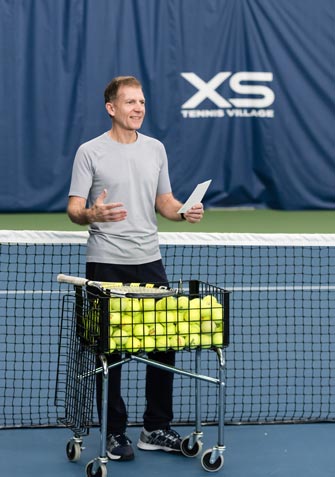Tennis Adds Years (of Fun) to Life
As he wound down a career in public relations, Tedino actively searched for ways to turn his passion for the sport into a fulfilling second act. He became a certified tennis pro and got increasingly involved with his local club.
“For me, any day on the tennis courts is a great day,” Tedino says. “I love tennis.”
These days, Tedino spends pleasant afternoons helping high school athletes improve their games as head tennis coach at St. Ignatius College Prep, a private school in downtown Chicago. He also keeps his communications skills honed as an advisor to the Chicago District Tennis Association, a board member at Lincoln Park Tennis Association, and a published tennis writer.
Tedino firmly believes people of all ages and abilities can get into the game and reap its many rewards, just as he does. “It’s such a great sport in terms of health benefits, socialization, and the ability to learn and continually improve,” says Tedino. “There is no prior experience or skill that’s needed, just the desire to learn the sport. And it’s fun to be out there playing.”

Stay Strong as You Get Older
Unlike, say, tackle football or ice hockey, tennis is truly an activity that can be enjoyed for a lifetime—and it pays enormous dividends in physical fitness as you get older. Tennis involves vigorous use of the upper body and core as much as the lower body. Working out the full range of muscle groups is vital for staving off age-related muscle loss.
Playing tennis regularly is associated with heart-healthy factors like lower body fat, better cholesterol levels, and aerobic fitness. Tennis players tend to have stronger cardiovascular, metabolic, and bone health. They also often exhibit more agility, balance, and coordination than nonplayers.
Keep Your Brain Sharp
Concentrating intensely on that fast-flying ball forces your brain to quickly size up a multitude of different variables. “In addition to the physicality of it, your mind is constantly working,” says Tedino. “If you’re playing singles, it’s just you, figuring out how to win points against your opponent. Tennis teaches people how to problem solve.”
It’s a feat to simultaneously consider the angle of the bounce, speed, and physics so you can line up your body in the right way to direct the ball where it should go. “You have to develop resilience and have a really good mental attitude,” says Tedino. “You have to be able to shake off the errors, get them out of your mind, and keep going.”
Promote Longevity
Tennis has been called the single best sport for a longer life. A 2017 British study found that regular players of tennis and other racket sports tended to live longer, not only compared to sedentary people, but also compared to people who exercised solo through jogging, swimming, or biking, The New York Times reported.
Another study followed in 2018, in which Danish researchers observed over 8,000 participants for about 25 years to compare the effects of a variety of sports on longevity. Again, tennis was a clear winner, associated with an astonishing 9.7-year-longer life span. By comparison, badminton was shown to add an average of 6.2 years to life expectancy; soccer, 4.7 years; cycling; 3.7 years; swimming, 3.4 years; and jogging, 3.2 years.
One possible explanation the researchers offered was that tennis mimics interval training, an especially efficient form of exercise characterized by a mix of high- and low-intensity bursts of exertion. This type of physical workout is believed to improve health more than moderately paced efforts like walking or jogging.
Foster Friendships
Another reason tennis may pack an extra wallop for health is that it involves being with other people. Humans thrive on social interaction and companionship. Getting outside, talking, and bonding with friends provides nourishment for the soul and an all-important sense of belonging. Supportive relationships naturally arise when you play tennis with friends, join a club, or organize a regular tennis meet-up with a partner.
Over the summer, Tedino was at a mixed-doubles event when he met a woman in her 70s. “She had picked up tennis in her 40s,” he says. “She’d gotten remarried, and her new husband played a lot of tennis. She said that as a kid, she couldn’t throw, couldn’t catch, and had always been picked last in all sports, so her goal was just to learn enough tennis to be able to say yes to someone if they asked her to play.”
She practiced, took lessons, and eventually became a solid player, making a lot of friends along the way. Years later, “She’s actually now a widow,” Tedino says. “She’s been able to maintain her social connections through tennis. Tennis is something that brings you together. You’ve got this activity, and then you go out for lunch or a drink afterward. It’s not just for older people—it’s for everybody.”

Relatively COVID-19 Safe
While the COVID-19 crisis has put a damper on people’s ability to stay active or get to the gym, tennis is particularly well suited to play during a global pandemic. When you’re outdoors on a court that measures 36 feet by 78 feet, it’s easy to stay a healthy 60 feet apart in a singles game. Doubles is often played with a spouse or a household member, though you can still keep well apart without much effort.
“Tennis is a sport where you can maintain social distancing without being socially distant,” says Tedino. “With [COVID-19], we’ve had an outpouring of people wanting to play. At my tennis club, we have bookings sunup to sundown every single day of the week.” Many people are working from home, so “they can steal an hour or two with a friend and head back in time for the next Zoom meeting.”
The United States Tennis Association (USTA) has a set of recommendations and guidelines on its website for playing tennis as safely as possible, including wearing masks appropriately, avoiding high fives, observing distancing rules, and leaving the area as soon as possible after your game is over.
Anyone Can Play
People of any age can play, and even play competitively. “Anyone with reasonably good mobility and eye-hand coordination can play,” says Tedino. “You don’t have to be particularly athletic, although fitness from other activities will serve you well on the court.”
The International Tennis Federation sponsors world competitions for seniors age 50 to 64 and super-seniors 65 and up. (In competitive tennis, players in their mid-30s and 40s are categorized as young seniors.)
Even if you’re mobility-impaired, don’t rule out tennis. “An area that has taken off is wheelchair tennis for adults or kids,” says Tedino. “It’s the exact same game, except wheelchair tennis players are allowed to have the ball bounce up to twice before they hit it.” There are wheelchair tennis programs around the U.S., and wheelchair tennis players have competed in the Paralympic Games since 1992.
To get started, all you need is a racket, a good pair of shoes, and some tennis balls. To find an appropriate racket, “Go to your local tennis or sporting goods store and get a mid-priced racket with the right-sized grip for your hand,” Tedino says.
No special clothing is required—just comfortable tops and bottoms that are breathable. Pockets are helpful for holding a tennis ball. If you’re older, investing in a good pair of supportive shoes is essential.
“I’d start out spending more money on shoes than a tennis racket,” says Tedino. “Don’t try to play tennis in running shoes, because you do a lot of side-to-side movement on the tennis courts.” Running shoes aren’t made for that.
To find beginner lessons and to find people with similar skill levels to play with, “Most people can find a way to get into tennis through a local parks and recreation department,” says Tedino. “Many cities offer instruction on weekends or in the evening. Tennis clubs do the same thing.”
The USTA website also has helpful information on its local chapters around the country. So, it might be time to consider picking up a tennis racket and trying out your swing. It’s a hobby that could add years—and years of fun times—to your life.